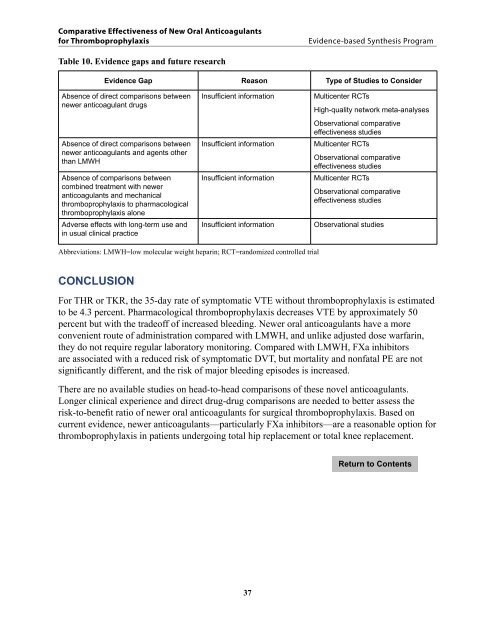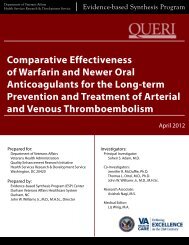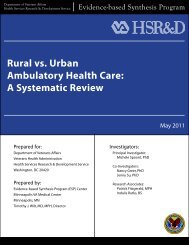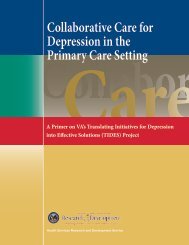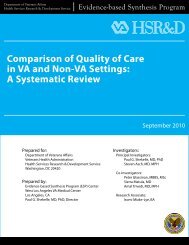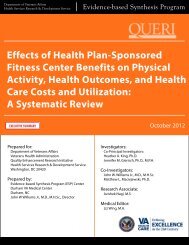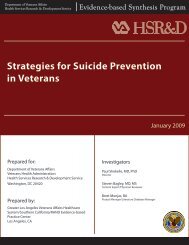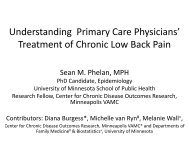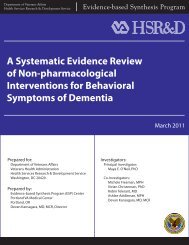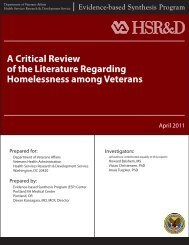Comparative Effectiveness of New Oral Anticoagulants for ...
Comparative Effectiveness of New Oral Anticoagulants for ...
Comparative Effectiveness of New Oral Anticoagulants for ...
You also want an ePaper? Increase the reach of your titles
YUMPU automatically turns print PDFs into web optimized ePapers that Google loves.
<strong>Comparative</strong> <strong>Effectiveness</strong> <strong>of</strong> <strong>New</strong> <strong>Oral</strong> <strong>Anticoagulants</strong><br />
<strong>for</strong> Thromboprophylaxis<br />
Evidence-based Synthesis Program<br />
Table 10. Evidence gaps and future research<br />
Evidence Gap Reason Type <strong>of</strong> Studies to Consider<br />
Absence <strong>of</strong> direct comparisons between<br />
newer anticoagulant drugs<br />
Absence <strong>of</strong> direct comparisons between<br />
newer anticoagulants and agents other<br />
than LMWH<br />
Absence <strong>of</strong> comparisons between<br />
combined treatment with newer<br />
anticoagulants and mechanical<br />
thromboprophylaxis to pharmacological<br />
thromboprophylaxis alone<br />
Adverse effects with long-term use and<br />
in usual clinical practice<br />
Insufficient in<strong>for</strong>mation<br />
Insufficient in<strong>for</strong>mation<br />
Insufficient in<strong>for</strong>mation<br />
Insufficient in<strong>for</strong>mation<br />
Multicenter RCTs<br />
High-quality network meta-analyses<br />
Observational comparative<br />
effectiveness studies<br />
Multicenter RCTs<br />
Observational comparative<br />
effectiveness studies<br />
Multicenter RCTs<br />
Observational comparative<br />
effectiveness studies<br />
Observational studies<br />
Abbreviations: LMWH=low molecular weight heparin; RCT=randomized controlled trial<br />
CONCLUSION<br />
For THR or TKR, the 35-day rate <strong>of</strong> symptomatic VTE without thromboprophylaxis is estimated<br />
to be 4.3 percent. Pharmacological thromboprophylaxis decreases VTE by approximately 50<br />
percent but with the trade<strong>of</strong>f <strong>of</strong> increased bleeding. <strong>New</strong>er oral anticoagulants have a more<br />
convenient route <strong>of</strong> administration compared with LMWH, and unlike adjusted dose warfarin,<br />
they do not require regular laboratory monitoring. Compared with LMWH, FXa inhibitors<br />
are associated with a reduced risk <strong>of</strong> symptomatic DVT, but mortality and nonfatal PE are not<br />
significantly different, and the risk <strong>of</strong> major bleeding episodes is increased.<br />
There are no available studies on head-to-head comparisons <strong>of</strong> these novel anticoagulants.<br />
Longer clinical experience and direct drug-drug comparisons are needed to better assess the<br />
risk-to-benefit ratio <strong>of</strong> newer oral anticoagulants <strong>for</strong> surgical thromboprophylaxis. Based on<br />
current evidence, newer anticoagulants—particularly FXa inhibitors—are a reasonable option <strong>for</strong><br />
thromboprophylaxis in patients undergoing total hip replacement or total knee replacement.<br />
37


